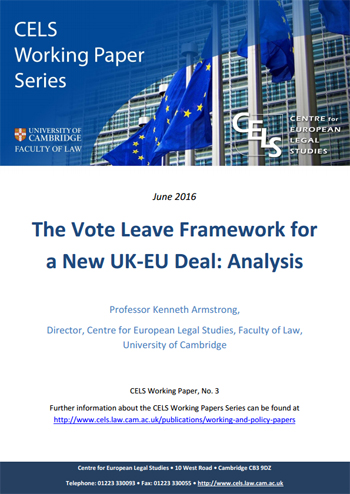 On 15th June the Vote Leave campaign published a 'roadmap' on the steps that it believes would need to be taken following a referendum vote on 23 June to leave the European Union.
On 15th June the Vote Leave campaign published a 'roadmap' on the steps that it believes would need to be taken following a referendum vote on 23 June to leave the European Union.
In an analysis published on 16th June, the Director of the Centre for European Legal Studies, University of Cambridge, Professor Kenneth Armstrong has provided the first legal analysis of this 'roadmap'.
The analysis concludes that:
- Article 50 TEU is the only credible legal mechanism by which the UK would withdraw from the EU and the alternative mechanisms proposed by Vote Leave – a renegotiation of the treaties under Article 48 TEU or resort to the Vienna Convention on the Law of Treaties – are either legally implausible or politically less attractive than resort to Article 50.
- In order for a withdrawal agreement to be concluded in the time-frame proposed by Vote Leave, and to avoid the risk of vetoes, the most plausible means of achieving this goal would be a withdrawal agreement that included a relatively minimal Swiss-style trade agreement that could over time be supplemented by future sectoral agreements. This is, however, unlikely to be consistent with the preferences of the EU institutions or indeed other Member States.
- The proposal to present a Bill in the current parliamentary session to amend the European Communities Act 1972 in a manner that could give rise to incompatibilities between UK law and EU law (without the UK having withdrawn from the EU) is politically improbable having regards to (a) the simultaneous opening of withdrawal negotiations with EU institutions and Member States and (b) the composition of the Commons and potential resistance from the Lords. Any legislation that was enacted would also draw the devolved governments and UK courts into a constitutional conflict with the Westminster Parliament. Instead of the sovereignty of parliament being restored, such legislation could result in domestic constitutional challenges to such sovereignty.
The full analysis can be found on the Working Papers page.

 Facebook
Facebook  X/Twitter
X/Twitter  Instagram
Instagram  YouTube
YouTube  Flickr
Flickr  LinkedIn
LinkedIn